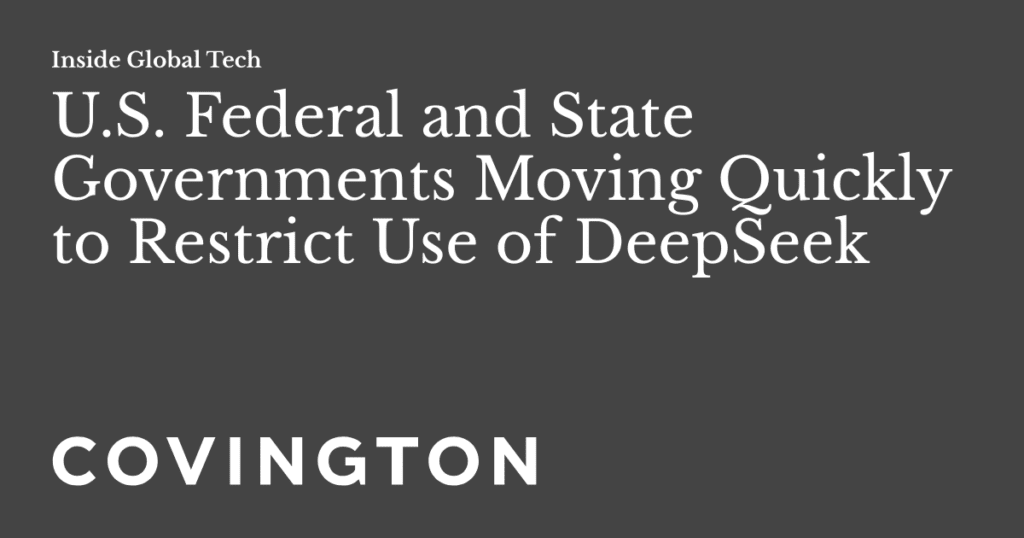Last month, DeepSeek, a Chinese AI start-up, made headlines by asserting that its new large language model, DeepSeek-R1, rivals leading AI models that typically require much higher investment in computing power. DeepSeek claims that its model runs on less than $6 million of computational resources derived from older and less robust chips. While some industry experts question the credibility of these claims, the model’s capabilities and the associated application captured significant interest, making DeepSeek’s application the top download in the U.S. by late January. Founded in July 2023, DeepSeek is owned by High-Flyer, a hedge fund located in Hangzhou, Zhejiang.
Given DeepSeek’s rapid rise in popularity, along with its Chinese ownership, U.S. Federal and State officials have voiced significant data security concerns. These worries mirror the considerations that led to a FAR rule banning telecommunications equipment and services from various Chinese manufacturers, including Huawei. Remarkably, officials across the government, from the White House to state administrations, have swiftly responded to the perceived threats posed by DeepSeek, indicating a growing urgency surrounding its potential implications for national security.
Federal Government-Wide Responses
A bipartisan bill aimed at banning DeepSeek from governmental devices was introduced on February 7 by Representatives Gottheimer (D-NJ-5) and LaHood (R-IL-16). Both representatives serve on the House Permanent Select Committee on Intelligence and expressed grave national security concerns regarding DeepSeek. Rep. Gottheimer declared that evidence suggests the Chinese Communist Party may exploit DeepSeek to access sensitive U.S. citizen data, likening the scenario to a “five-alarm national security fire.” Rep. LaHood emphasized that allowing a CCP-controlled company to access sensitive data is unacceptable.
The specifics of the proposed legislation have yet to be disclosed, but any ban on DeepSeek could be extended by the FAR Council to cover all federal contractors. Such an exclusion might include not just significant contracts but also smaller ones, creating ambiguities about implementation for contractors regarding affected devices.
Further Legislative Measures
Additional legislative initiatives aimed at limiting Chinese access to advanced technology, including AI, could also impact DeepSeek. For instance, Senator Josh Hawley (R-MO) proposed a comprehensive U.S.-China AI Decoupling Bill on January 29, which, if enacted, could effectively prohibit the utilization of DeepSeek’s AI models in the U.S. Furthermore, on February 7, Representative Mark Green (R-TN-7) introduced the China Technology Transfer Control Act (HR 1122), mandating the President regulate the export or transfer of national interest technologies to China, a bill that Green links directly to DeepSeek’s alleged use of U.S. technology in its AI model developments.
Agency and Department Responses
In a predictable move, the Pentagon’s Defense Information Systems Agency (DISA) began restricting access to DeepSeek on January 28, following reports of its use on government devices. The U.S. Navy previously issued a directive on January 24, banning all personnel from using DeepSeek due to security and ethical concerns. The Navy emphasized the importance of rigorous adherence to this prohibition in relation to both work-related tasks and personal usage.
NASA also issued a directive on January 31, explicitly prohibiting the use of DeepSeek products on government devices and networks. This memo reinforced that NASA personnel could neither upload agency data onto DeepSeek’s platform nor access DeepSeek from government-issued devices or network connections.
State Government Actions
On January 31, Texas became the first state to impose a ban on AI applications associated with China, including DeepSeek, on state-issued devices. Governor Greg Abbott underscored that the state’s critical infrastructure is not to be compromised by Chinese data-harvesting AI. Following suit, on February 10, New York’s Governor Kathy Hochul declared a ban on DeepSeek’s AI application within the state, citing concerns related to foreign surveillance. Virginia quickly followed on February 11, prohibiting DeepSeek’s usage on state devices through Executive Order 46.
As a result of these developments, legislative efforts in Georgia and Kansas have emerged to introduce bills targeting the prohibition of DeepSeek and other Chinese AI models on state-issued devices. With ongoing scrutiny and legislative momentum building, it is expected that further regulatory actions against DeepSeek will unfold in the coming weeks and months, particularly given the shared concerns across government entities about the risks posed by this technology.




